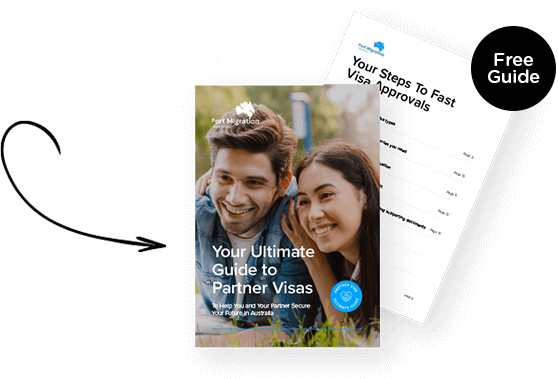Applying for an Australian Partner Visa can feel overwhelming, but you’re not alone!
In this post, we answer the top 10 most common questions about Partner Visa applications to help you navigate the process with confidence.
We’ve included common questions people ask us frequently when they are trying to figure out eligibility, gather the right documents, or understand the differences between temporary and permanent visas.
Keep reading to get practical tips and insights that will make your visa journey smoother and less stressful.
Partner Visa Key Facts
- The Partner Visa application requires proof of a genuine and ongoing relationship.
- Processing times for Partner Visas can range from 12 to 24 months or longer.
- You may need to complete health and character checks as part of your application.
- Learn more about Partner Visas
Partner Visa Subclasses:
1. Am I eligible for a Partner visa?
This isn’t always the first question people ask, but it should be!
To be eligible for a Partner visa, you need to be in a genuine relationship with an Australian citizen, permanent resident, or eligible New Zealand citizen. This relationship can be a marriage, de facto relationship, or engagement (for the Prospective Marriage Visa).
You must provide evidence to support your relationship's authenticity, such as joint financial accounts, shared residential address, and social acknowledgment.
Additionally, you need to meet health and character requirements, which may include medical examinations and police clearances from any country where you've lived for more than a year in the past decade.
2. How do I show our relationship is real?
Proving your relationship's genuineness involves providing a variety of evidence. This includes evidence like joint financial documents (like bank statements and shared bills), proof of living together (rental agreements or utility bills), and evidence of social recognition (photos, social media interactions, and statements from friends and family).
Detailed personal statements from both partners outlining the history and nature of your relationship are also crucial. Click here to purchase our Relationship Statement guide.
The more comprehensive and consistent your evidence, the better your chances of demonstrating a genuine and ongoing relationship.
3. What documents do I need for my application?
Your Partner visa application requires several key documents. These typically include identification documents (passports, birth certificates), proof of relationship (marriage certificates, joint financial statements, photos), character documents (police checks), and health documents (medical examination results).
You will also need to provide additional documents like travel records, correspondence, and declarations from friends and family confirming your relationship.
Ensure all documents are certified copies and translations if they are not in English.
Click here to download our Free Guide to Partner Visas for more information.
4. How long will it take to get my Partner visa?
Processing times for Partner visas can vary significantly. On average, it can take between 12 to 24 months for a temporary Partner visa (subclass 820) to be processed.
The permanent Partner visa (subclass 801) generally takes an additional 12 months after the temporary visa is granted.
However, these times can be longer depending on individual circumstances, the completeness of your application, and current processing times at the Department of Home Affairs.
Regularly checking the status of your application and ensuring all requested information is promptly provided can help avoid delays.
Subscribe on YouTube for regular Partner Visa Processing updates.
5. Can I include my kids in the application?
Yes, you can include dependent children in your Partner visa application. Each child will need to meet health and character requirements, similar to the main applicant. You will need to provide evidence of their identity, relationship to you (birth certificates), and, if applicable, custody arrangements.
Including your children in your application may increase the overall processing time and costs, so be sure to provide all necessary documentation and information to facilitate the process.
6. Do I need a health check for the visa?
All Partner visa applicants must undergo a health examination. This usually includes a medical assessment, chest X-ray, and possibly additional tests depending on your health history and age.
The purpose is to ensure that you meet Australia's health requirements and do not pose a significant cost or risk to the Australian community. You must have the examination conducted by an approved panel physician.
The results are sent directly to the Department of Home Affairs, and you typically receive instructions on how to arrange these exams after submitting your visa application.
7. What if we break up while waiting for the visa?
If your relationship ends while your Partner visa application is being processed, you must inform the Department of Home Affairs immediately. The outcome depends on your situation; in most cases, the visa application will be refused. However, exceptions may apply, such as in cases of domestic violence or if you have a child with your partner.
It is important to provide full details of your situation to the Department, and you may need to seek legal advice to understand your options and any potential impacts on your visa status.
8. How much will the visa application cost?
The cost of a Partner visa can be substantial. As of now, the base application charge is AUD 8,850. Application fees typically increase each year on 1 July.
Additional costs may include health examinations, police checks, translation of documents, and migration advice. If you include dependent children in your application, there will be additional charges for each child. It's important to budget for these costs and ensure you have the necessary funds available.
Fees are subject to change, so always check the latest information on the Department of Home Affairs website before applying.
9. Can I work in Australia while my visa is being processed?
If you apply for a Partner visa while in Australia (onshore application), you will generally be granted a Bridging Visa A (BVA) which allows you to stay in Australia while your application is processed. This visa typically comes with work rights, meaning you can work while waiting for your Partner visa to be approved.
If your application is lodged offshore, you will need to remain outside of Australia until a decision is made, unless you have another visa that allows you to enter and work in Australia.
Always seek information about work rights that is specific for your circumstances and check the conditions of any visa that you hold.
10. What's the difference between the temporary and permanent Partner visas?
The Partner visa process involves two stages. The temporary Partner visa (Subclass 820 or Subclass 309) is the first stage, allowing you to live in Australia temporarily. After two years, if your relationship is still ongoing, you can apply for the permanent Partner visa (Subclass 801 or Subclass 100).
This visa grants you permanent residency in Australia, with the ability to live, work, and study indefinitely. The transition from temporary to permanent is contingent upon the continuation of your relationship and meeting other eligibility criteria.
Learn more about Permanent Partner Visa Processing.11. Where can I get Partner Visa help?
At Port Migration we love helping our clients who are excited about starting life together in Australia. Achieving visa success for our clients is our main goal. We pride ourselves on the way we make a complex process simple and stress free. You can find out more about us here.
Each visa has a different application process and requirements. The waiting times for the visas are also different, and the wait time can be impacted by the country that you come from. Constant changes to the Australian Migration Legislation also make it hard to know which option is the best for you.
Talk to the team at Port Migration to book an in depth consultation to get the ball rolling on the application that best suits your needs and circumstances.
Have questions about Partner Visas?
Download your FREE Partner Visa guide
Navigating partner visas can be complex and overwhelming, download our step-by-step Partner Visa Guide and checklist that simplifies the process for you.


